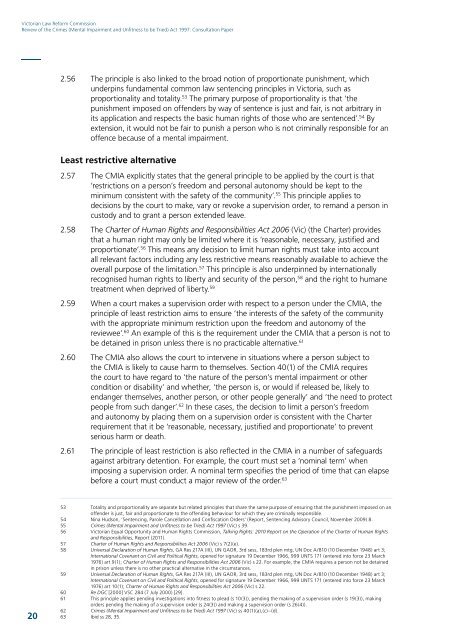Crimes Mental Impairment consultation paper.pdf - Victorian Law ...
Crimes Mental Impairment consultation paper.pdf - Victorian Law ...
Crimes Mental Impairment consultation paper.pdf - Victorian Law ...
You also want an ePaper? Increase the reach of your titles
YUMPU automatically turns print PDFs into web optimized ePapers that Google loves.
<strong>Victorian</strong> <strong>Law</strong> Reform Commission<br />
Review of the <strong>Crimes</strong> (<strong>Mental</strong> <strong>Impairment</strong> and Unfitness to be Tried) Act 1997: Consultation Paper<br />
2.56 The principle is also linked to the broad notion of proportionate punishment, which<br />
underpins fundamental common law sentencing principles in Victoria, such as<br />
proportionality and totality. 53 The primary purpose of proportionality is that ‘the<br />
punishment imposed on offenders by way of sentence is just and fair, is not arbitrary in<br />
its application and respects the basic human rights of those who are sentenced’. 54 By<br />
extension, it would not be fair to punish a person who is not criminally responsible for an<br />
offence because of a mental impairment.<br />
Least restrictive alternative<br />
2.57 The CMIA explicitly states that the general principle to be applied by the court is that<br />
‘restrictions on a person’s freedom and personal autonomy should be kept to the<br />
minimum consistent with the safety of the community’. 55 This principle applies to<br />
decisions by the court to make, vary or revoke a supervision order, to remand a person in<br />
custody and to grant a person extended leave.<br />
2.58 The Charter of Human Rights and Responsibilities Act 2006 (Vic) (the Charter) provides<br />
that a human right may only be limited where it is ‘reasonable, necessary, justified and<br />
proportionate’. 56 This means any decision to limit human rights must take into account<br />
all relevant factors including any less restrictive means reasonably available to achieve the<br />
overall purpose of the limitation. 57 This principle is also underpinned by internationally<br />
recognised human rights to liberty and security of the person, 58 and the right to humane<br />
treatment when deprived of liberty. 59<br />
2.59 When a court makes a supervision order with respect to a person under the CMIA, the<br />
principle of least restriction aims to ensure ‘the interests of the safety of the community<br />
with the appropriate minimum restriction upon the freedom and autonomy of the<br />
reviewee’. 60 An example of this is the requirement under the CMIA that a person is not to<br />
be detained in prison unless there is no practicable alternative. 61<br />
2.60 The CMIA also allows the court to intervene in situations where a person subject to<br />
the CMIA is likely to cause harm to themselves. Section 40(1) of the CMIA requires<br />
the court to have regard to ‘the nature of the person’s mental impairment or other<br />
condition or disability’ and whether, ‘the person is, or would if released be, likely to<br />
endanger themselves, another person, or other people generally’ and ‘the need to protect<br />
people from such danger’. 62 In these cases, the decision to limit a person’s freedom<br />
and autonomy by placing them on a supervision order is consistent with the Charter<br />
requirement that it be ‘reasonable, necessary, justified and proportionate’ to prevent<br />
serious harm or death.<br />
2.61 The principle of least restriction is also reflected in the CMIA in a number of safeguards<br />
against arbitrary detention. For example, the court must set a ‘nominal term’ when<br />
imposing a supervision order. A nominal term specifies the period of time that can elapse<br />
before a court must conduct a major review of the order. 63<br />
20<br />
53 Totality and proportionality are separate but related principles that share the same purpose of ensuring that the punishment imposed on an<br />
offender is just, fair and proportionate to the offending behaviour for which they are criminally responsible.<br />
54 Nina Hudson, ‘Sentencing, Parole Cancellation and Confiscation Orders’ (Report, Sentencing Advisory Council, November 2009) 8.<br />
55 <strong>Crimes</strong> (<strong>Mental</strong> <strong>Impairment</strong> and Unfitness to be Tried) Act 1997 (Vic) s 39.<br />
56 <strong>Victorian</strong> Equal Opportunity and Human Rights Commission, Talking Rights: 2010 Report on the Operation of the Charter of Human Rights<br />
and Responsibilities, Report (2011).<br />
57 Charter of Human Rights and Responsibilities Act 2006 (Vic) s 7(2)(e).<br />
58 Universal Declaration of Human Rights, GA Res 217A (III), UN GAOR, 3rd sess, 183rd plen mtg, UN Doc A/810 (10 December 1948) art 3;<br />
International Covenant on Civil and Political Rights, opened for signature 19 December 1966, 999 UNTS 171 (entered into force 23 March<br />
1976) art 9(1); Charter of Human Rights and Responsibilities Act 2006 (Vic) s 22. For example, the CMIA requires a person not be detained<br />
in prison unless there is no other practical alternative in the circumstances.<br />
59 Universal Declaration of Human Rights, GA Res 217A (III), UN GAOR, 3rd sess, 183rd plen mtg, UN Doc A/810 (10 December 1948) art 3;<br />
International Covenant on Civil and Political Rights, opened for signature 19 December 1966, 999 UNTS 171 (entered into force 23 March<br />
1976) art 10(1); Charter of Human Rights and Responsibilities Act 2006 (Vic) s 22.<br />
60 Re DGC [2000] VSC 284 (7 July 2000) [29].<br />
61 This principle applies pending investigations into fitness to plead (s 10(3)), pending the making of a supervision order (s 19(3)), making<br />
orders pending the making of a supervision order (s 24(3)) and making a supervision order (s 26(4)).<br />
62 <strong>Crimes</strong> (<strong>Mental</strong> <strong>Impairment</strong> and Unfitness to be Tried) Act 1997 (Vic) ss 40(1)(a),(c)–(d).<br />
63 Ibid ss 28, 35.

















